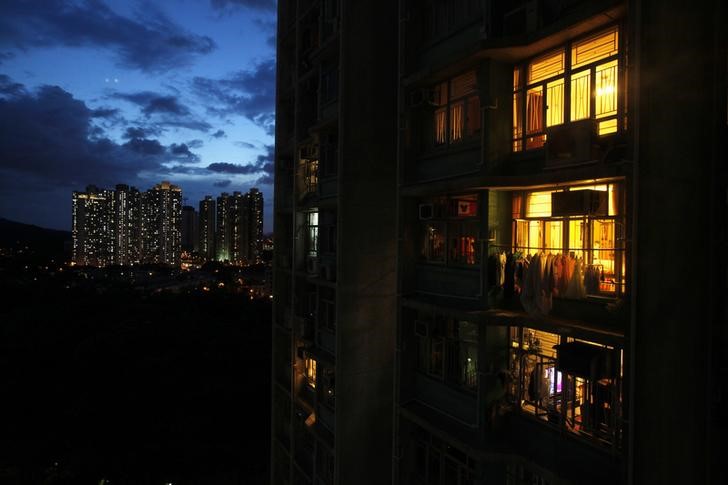* Hang Seng falls over 5% as Beijing plans new security law
* Hong Kong latest front in deteriorating U.S.-China ties
* China pledges more stimulus, does not set 2020 growth target
* European shares seen falling 1%, oil sinks 7%
By Hideyuki Sano
TOKYO, May 22 (Reuters) - Global shares tumbled on Friday as Hong Kong's political unrest returned as a flashpoint in fast-deteriorating U.S.-China relations, following Beijing's moves to impose a new security law on the city.
The Asian financial hub's benchmark Hang Seng index .HSI sank 5% to a seven-week low, pulling MSCI's broadest index of Asia-Pacific shares outside Japan .MIAPJ0000PUS down 2.5%.
The CSI300 index of mainland Chinese shares .CSI300 dropped 1.9% while Japan's Nikkei .N225 lost 1%. Pan-European Euro Stoxx 50 futures STXEc1 were down 0.97% while e-mini futures for U.S. S&P500 EScv1 lost 0.8%.
China is set to impose new national security legislation on Hong Kong to tighten its grip on the semi-autonomous city. decision drew a warning from President Donald Trump that Washington would react "very strongly" against the attempt to gain more control over the former British colony.
"It is starting to look like a U.S.-China summer of discontent in the making," said Stephen Innes, chief global market strategist at AxiCorp.
"So far, China's response has been relatively tame despite Trump's daily goading. That might be due so that policymakers can focus on the NPC, but there is always the possibility of a firmer response."
Hong Kong activists called on Friday for people to rise up against Beijing's plans although a proposed midday march in the central financial district did not materialise. new Sino-U.S. rift comes amid already tense relations between the two superpowers after Washington stepped up its rhetoric against China over the coronavirus and other points of difference.
Earlier this month, the U.S. State Department delayed a report to Congress assessing whether Hong Kong enjoys sufficient autonomy from China to continue receiving special treatment from the United States. has ramped up criticism of China over the origins of the pandemic. Last week, it moved to block global chip supplies to blacklisted telecoms equipment giant Huawei Technologies HWT.UL , while the U.S. Senate passed legislation that could prevent some Chinese companies from listing their shares on U.S. exchanges. tensions are casting a pall over recent optimism that the worst of the pandemic's economic impact was already over in most developed countries.
The pace of recovery remains highly uncertain -- a point highlighted by China's decision not to set an economic growth target this year for the first time in decades. Beijing pledged more government support for the virus-hit economy, it set a target to create over 9 million urban jobs this year, down from a goal of at least 11 million in 2019 and the lowest since 2013.
"The absence of a GDP growth target for this year confirms that, as we expected, policymakers accept that, after the plunge in Q1, economic growth will be low for 2020 as a whole even with a significant sequential recovery in Q2-Q4," Oxford Economics said in a note to clients.
"The sizeable overall fiscal deficit target indicates significant policy support for the domestic recovery that we expect to continue despite the challenging external background. We expect year-on-year GDP growth to average 4% in H2."
The worsening mood pushed riskier currencies lower, with the Australian dollar dropping 0.5% to $0.6531 AUD=D4 and the euro easing 0.25% to $1.0922 EUR= .
The safe-haven yen gained 0.15% to 107.45 per dollar JPY= .
The yen brushed off the Bank of Japan's new lending scheme to channel more money to small businesses, which mimics the U.S. Federal Reserve's "Main Street" programme. decision had been widely anticipated after the BOJ flagged the creation of the scheme last month.
Oil prices also tumbled from a two-month peak with U.S. crude futures CLc1 losing 7.3% to $31.44 per barrel.
<^^^^^^^^^^^^^^^^^^^^^^^^^^^^^^^^^^^^^^^^^^^^^^^^^^^^^^^^^^^ Hong Kong shares and protests
https://tmsnrt.rs/2MJbLuj
^^^^^^^^^^^^^^^^^^^^^^^^^^^^^^^^^^^^^^^^^^^^^^^^^^^^^^^^^^^> (Editing by Kim Coghill and Sam Holmes)
